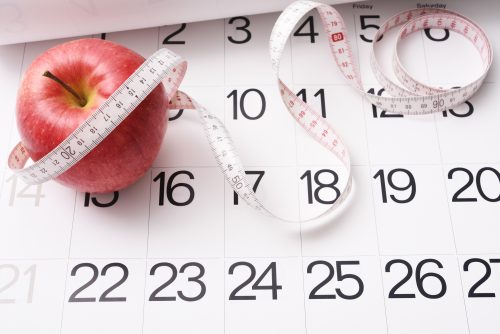
Nutritionist Zoe Wilson reveals the real reasons why traditional diets don’t work — and the new approach that will see you keep the weight off for life.
It seems almost every day there is a new miracle weight-loss plan, promising you will shed kilos in just five days — or even less. While it sounds very tempting, research strongly shows us these diets don’t work. Sure, if you follow the plan for a time, you will most likely lose a bit of weight, sometimes even quickly. But eventually, you will stop the diet and in the overwhelming majority of cases, be likely to put the weight back on — plus a few extra kilos.
Successful weight loss is all about creating a healthy relationship with your food and your body. So, what can you do to break out of the cycle of constant dieting? It all comes down to a different but straightforward approach to how you look at food, ensuring you keep the weight off for life.
Days of dieting
We know New Zealand is undergoing an obesity epidemic — currently one in four adults (over 15 years) and one in 12 children are obese.
But our fascination with dieting isn’t a new thing. It seems as far back as the times of Hippocrates and Socrates being ‘too fat’ has been frowned upon, with exercise and even vomiting prescribed to ‘cure’ being overweight. There were also times where a more voluptuous figure was considered the ideal as it was a sign of wealth — but generally, being overweight has been seen as the embodiment of gluttony and something to be avoided. The nineteenth century saw fad diets surface, with the mass recommendation of the first low-carb diet. Since then, we have seen the likes of Atkins, South Beach, Lemon Detox, Fit For Life, the three-day diet, the HCG diet, Dukan, Zone and Paleo diets all sweep to the top of the best-seller list, each one promising to be the ultimate solution to all our weight woes. Plus, there have been more meal replacements, laxatives, appetite-suppressants and metabolism boosters than you can poke a stick at. All of these diets have promised to be the cure to all of our weight-loss problems. So, why then, do we still have a problem?
Well, it’s complicated. We live in a world where there is so much food that is readily available at all hours. At the same time, our lives are more sedentary than at any other time in history. So while governments and health professionals try to figure out policies that may help us, what can we all do to look after our own waistlines?
The damage of the diet cycle
Health professionals recognise there are major problems with the very idea of ‘dieting’. It can damage your metabolism and your relationship with food, leaving you in a worse place than where you began. Dieting can become a vicious cycle. You diet, you fall off the wagon, so you vow to diet again — yet you resent being deprived of food, so you fall off again and suddenly, your weight is see-sawing and you’re at war with food — and your body.
The diet begins
| YOU SAY TO YOURSELF | WHAT HAPPENS |
| Argh! I’m hungry | |
| Yay, it’s working! | Initial weight-loss (muscle and fat) due to a lack of kilojoules |
| I’m craving chocolate – I’ll just have one piece! | Famine response – metabolism slows due to lack of kilojoules, loss of muscle and fat storage increases |
| Now I feel guilty… oh well, I’ve ruined it now, I might as well eat the whole block | Diet ends and you resume old eating habits |
| I’m such a failure – why can’t I do anything right? | Feast response – weight regain (usually more than you lost) as metabolic rate is still low |
| I’ll start the diet again tomorrow… |
Make peace with food
A growing number of weight loss experts have realised traditional diets don’t work and are warning against dieting and falling into the trap of the diet cycle. There’s now a movement towards a more holistic approach — one that’s more about promoting life-long healthy habits rather than focusing on immediate weight- loss. The theory is, if you can develop a healthy relationship with your body, food and exercise, that doesn’t involve guilt and anxiety, you will be much more likely to enjoy and maintain a healthy weight for the long term.
A growing body of research is showing the ‘non-diet’ approach is a successful one. A major study recently tested a group of female chronic dieters. For six months, half the group was put on a traditional ‘diet’ that included restricted kilojoule meals, behaviour therapy and exercise, while the other group was allowed to eat normally and do exercise they enjoyed. At the same time, they learned about body and self-acceptance, eating behaviours and nutrition, and received social support.
Two years down the track, the non-dieting group had maintained their weight, were more active and had improved their cholesterol, blood pressure, self-esteem and even reduced symptoms of depression. On the other hand, while the traditional weight loss group lost weight after one year (an average of 5.9kg), two years later they had regained the weight and didn’t see any improvements to their cholesterol, blood pressure, depression or self-esteem.
As these results show, weight management is a strategy for life. In our quick-fix society we may yearn to lose five kilos for that holiday, wedding or special event. But it pays to understand that despite the many tempting claims made by fad diets, this approach isn’t going to give you the lasting results you’re craving.
Furthermore, it’s good to know that, by contrast, this ‘non-diet’ approach does have lasting pay-off for our health and well-being — and will give us the mastery of our bodies and a relaxed and positive attitude towards food.
Anyone who has a negative relationship with food, exercise or their appearance, or anyone who finds it difficult to eat only when they are hungry will be able to improve their health
in the long-term.
10 tips to help break the diet cycle
- It’s OK to have an ‘imperfect’ meal or snack. You eat three meals a day, seven days a week so if one or two of these meals aren’t great, it’s no big deal!
- Before you eat, ask: ‘Am I actually hungry?’ That’s the grumbling, empty tummy hungry — not the ‘I don’t want to sit at my desk anymore’ hungry. If you’re not really hungry, is there something else you could do? Maybe you could step outside for some fresh air or make a phone call you’ve been meaning to make for a while.
- Turn off the TV, computer or phone to enjoy food. By eating with distractions such as these you won’t actually realise that you’ve had your meal or snack, leaving you wanting more when you don’t really need it. Take time out and sit at a table so you can concentrate on what you are eating.
- Have what you really want so you are satisfied. There’s no point in choosing to have a yoghurt or piece of fruit if you really want a piece of chocolate — you will feel cheated! Have the piece of chocolate (just not the whole block) and savour every moment of it!
- Try and take note of the ‘sigh moment’. There is a moment when we are eating a meal when our stomach says it is full. We will often pause and take a big breath. Most of us will miss this cue because there may still be food on our plates. Try to notice this cue and put down your knife and fork.
- Eat slowly! Time yourself and try to take at least 20 minutes to eat your meal. This gives your stomach enough time to tell your brain that it is full. To take longer, put your knife and fork down in between mouthfuls, cut your food in smaller pieces and focus on tasting your food.
- Don’t deprive yourself in social settings. Our culture is based around food, so in social situations you may want to join in and that’s fine. Don’t beat yourself up about it. If you’re really not hungry though, adjust your portions so you order an entrée instead of a main or share a nibble with a friend instead of ordering one each.
- Practise leaving the table satisfied but not full. There’s a difference between not feeling hungry anymore and feeling stuffed to the brim. Practise listening to your stomach as you eat and try to finish on a ‘hunger scale’ of about 7/10 — with 0/10 being starving and a score of 10/10 being full-to-absolutely bursting.
- Pretend you’re a critic! With each mouthful, think about the flavour and texture, and look at how appealing the meal is to your eye. By actually appreciating your food, you will feel more satisfied.
- Use smaller crockery and glassware. This makes a smaller portion look bigger, helping you eat less. Replace dinner plates with entrée-sized plates, and swap 500ml glasses with 250ml glasses.
Did you know? 95% of people who diet put the weight they lost back on within three to five years.
www.healthyfood.com










